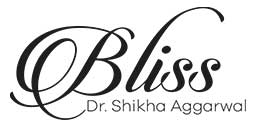
Near Hero DMC Heart Centre,
Ludhiana, Punjab 141001
Sunday: 10 am - 1 pm
Eczema Treatment in Ludhiana
Eczema: Symptoms, Causes, Types & Treatment
Eczema can affect anyone anytime!
It is a chronic skin condition characterised by dryness, itchiness, roughness, rashes, and infection. It is a type of dermatitis- a group of skin conditions that inflames and irritates the skin. It can manifest in individuals differently, based on their unique skin type and tone. The condition can affect both children and adults. But mostly it is seen in children.
What are the types of eczema?
 Dr. Shikha Aggarwal, skin doctor at Bliss laser Skin Clinic provides outstanding and advanced Eczema Treatment in Ludhiana. She categorises this condition into seven types, namely:
Dr. Shikha Aggarwal, skin doctor at Bliss laser Skin Clinic provides outstanding and advanced Eczema Treatment in Ludhiana. She categorises this condition into seven types, namely:
- Atopic dermatitis/ atopic eczema, or allergic eczema- This is the most common type, triggered by allergic disorders like asthma and hay fever. It often starts to show up in childhood.
- Contact dermatitis- Nearly everyone can come in contact with some skin irritant or allergen that causes skin rash. The skin irritants include chemical-based skin care products, soaps and detergents, nickel-based jewellery, and industrial chemicals like solvents and cement. Common allergens include fragranced products, beauty products with latex, rubber, or preservative; thimerosal, nickel, and some other metals, and poison ivy.
- Dyshidrotic eczema- This is a less common, more challenging type of eczema characterised by outbreaks of tiny blisters on the palms of the hands, sides of the fingers, and soles of the feet. Sweat or metal exposure can trigger it.
- Nummular (coin-shaped) eczema- It often appears following a skin injury like an insect bite or skin burn. This type is mostly seen in people whose family members have allergies or atopic dermatitis.
- Neurodermatitis- This form of eczema causes only 1-2 severely itchy patches often on an arm, neck, back, or leg. Mostly, it affects women belonging to the age group 30-50. It can be triggered by other types of eczema, very dry skin, or some mental health issues.
- Stasis dermatitis- This type is seen in people facing poor blood flow, usually in their lower legs. Being overweight or obese can trigger it.
- Seborrheic dermatitis- This occurs in body sites having a lot many sebaceous glands. If it’s on the scalp, it’s called dandruff.
What causes eczema?
- An allergic response by immune system cells to some skin irritant
- Problems in the skin’s barrier that make the skin deprived of moisture and allow easy entry of germs
- Having a family history of other allergies like asthma and hay fever.
Some things can cause eczema symptoms to worsen. These triggers are:
- Viral infections
- Stress
- Environmental conditions like cold/damp areas or swampy, hot
- Chemicals
- Artificial colours
- Preservatives
- Fragranced products
- Prickly fabrics/woollen
- Sand.
What are the Symptoms of Eczema?
Eczema looks different in every affected individual and its flare-ups do not happen in the same spot every time. In general, eczema shows up as itchy, red, dry, cracked, or/and leathery skin. The symptoms of eczema do vary in infants, children, and adults.
Where do Symptoms of Eczema Appear on My Body?
- In infants, the itchy skin rash may cause oozing or crusting, mainly on the scalp and face. It can even appear on their legs, arms, back, or chest.
- Teenagers and young children usually present skin rash in their elbow bends, behind their knees, on their neck, or their ankles/wrists. Their rashes may turn scaly and dry.
- Adults have skin rashes on their faces, wrists, hands, feet, or back of the knees. Their skin probably gets very dry, scaly, or thick. Fair-skinned adults may have reddish to brown skin rashes while dark-skinned adults, the affected skin may appear lighter or darker than usual.
If one is suffering from eczema symptoms then one can consult Dr. Shikha Aggarwal, Skin Specialist in Ludhiana for more details on its management and treatment.
What Specialists Treat Eczema?
Dr. Shikha Aggarwal, dermatologist in Ludhiana specialises in the diagnosis, treatment, and follow-up care of people having skin problems like eczema. She is a top-notch skin specialist qualified to take care of eczema patients. She can also be consulted for babies and children having eczema.
How do Healthcare Professionals Diagnose Eczema?
Healthcare professionals like dermatologists or allergists diagnose eczema by talking to patients and performing their skin examinations. They may even order some allergy tests to help with diagnosis and preparation of a treatment plan. They can help identify eczema triggers.
What is the Best Treatment for Eczema?
Eczema treatment in Ludhiana works to heal the affected skin and prevent flare-ups of symptoms in the future. Depending upon the patient’s age, symptoms, and current health status, a skin specialist develops a treatment plan for the patient. The treatment options include medications, phototherapy, and home self-care.
Medications beneficial for reducing eczema symptoms include antibiotics, systemic/topical corticosteroids, oral immunosuppressants, antihistamines, topical calcineurin inhibitors, barrier repair moisturisers, and biologics. Home remedies to help ease symptoms of eczema include wet wraps, colloidal oatmeal baths, calamine lotion, coal tar, and stress-relieving techniques.
What is the Prognosis of Eczema?
Eczema is not a deadly skin condition. Nearly 50% of children with eczema can outgrow eczema or experience improvement in their skin condition by the time they become teenagers. Others may continue to suffer from the condition for the rest of their lives.
For adults having eczema, a good skin care regimen can help manage the skin condition. The eczema flare-ups can last for a few days or even a few weeks for different people. There might be times when eczema flare-ups do not happen for long periods.
Is there a Cure for Eczema?
No. There are only treatments available for eczema to reduce their symptoms. None of the treatments can help eliminate 100% of symptoms at a time. As eczema is a chronic condition, it can resolve and reappear unexpectedly.
Is it Possible to Prevent Eczema?
Yes, some steps can be taken to prevent eczema flare-ups and outbreaks or avoid them from getting worse.
Is Eczema Contagious?
No. Healthy people cannot catch eczema from those experiencing the condition. Researchers believe that eczema can develop due to interaction between genes and environmental triggers.
How can I Prevent Eczema?
Here are some tips to prevent eczema:
- Daily use moisturiser after bath or when skin is dry to keep the skin locked with moisture.
- Take a bath or shower with lukewarm water.
- Keep your body well-hydrated by drinking plenty of water daily.
- Try to not sweat much or get indulged in activities that make the skin too hot.
- Pay attention to your diet. Avoid having foods that might trigger symptoms.
- Regularly exercise to increase blood circulation and manage your stress.
- Wear clean, loose garments. Avoid wearing rough fabrics like wool or synthetic fibres.
- Practice relaxation techniques if stressed and see a psychiatrist or therapist for medications or counselling, if you have poor mental health.
- Avoid skin irritants or allergens.
- Use a humidifier in cold, dry weather to avoid dry skin.
For more information on eczema, their symptoms, causes, and treatment get in touch with skin experts at Bliss Laser Skin Clinic.


